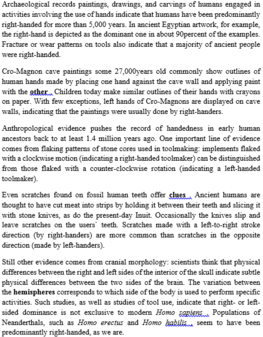*Read the following passage and mark the letter A, B, C, or D on your answer sheet to indicate the correct answer to each of the questions from 24 to 30. Twenty-five students from Walling School are currently living in France. They are there for three months as part of a living-abroad project. The 16- and 17-year-old students are living with French families and attending a French school. Most of the students have taken French language classes for 3 or 4 years and are finally getting an opportunity to use their French. Not only are students learning a new language, but they are learning about a new culture, too. Students have been particularly surprised about the French attitude towards food. “They won’t leave anything on their plate,” says Vanessa Athol. “They aren’t wasteful at all.” Vanessa has vowed to be more careful with waste when returning to the United States. The group’s chaperone, Mrs. Smith, has been pleased with the students’ acquisition of language. “Even the most timid are trying their best to speak. The students are learning a lot. I’m very impressed,” she said. Mrs. Smith added that she thinks living with a French family makes a difference because students are forced to speak French. “We are all very grateful to the French families who are hosting us.” The French families are happy to have the students, as they are getting to leam about American culture. Both groups will be celebrating the exchange at a large potluck dinner at the end of the stay. There will be a slide show of memories and the students will speak about their experiences. Currently, the American students are periodically posting pictures and student essays on the Walling School website. “Living in France is an experience I’ll never forget,” writes student Tina Davis. “I know I’ll want to eat these croissants and this Camembert for the rest of my life!” (Source: 'Master TOEFL Junior (2014))
According to the passage, how will the students conclude their stay?
A. They will say in hostel together.
B. They well take a French exam.
C. They will have a party together.
D. They will visit Paris together.




Chọn C Theo đoạn văn, học sinh sẽ kết thúc kì nghỉ của họ như thế nào?
A. Họ sẽ nói với nhau trong ký túc xá.
B. Họ cũng tham gia một kì thi tiếng Pháp.
C. Họ sẽ có một bữa tiệc với nhau.
D. Họ sẽ thăm Paris cùng nhau
Đáp án C.
Dẫn chứng: Both groups will be celebrating the exchange at a large potluck dinner at the end of the stay – Cả hai nhóm sẽ tổ chức buổi giao lưu tại một bữa ăn tối lớn vào cuối kì lưu trú..